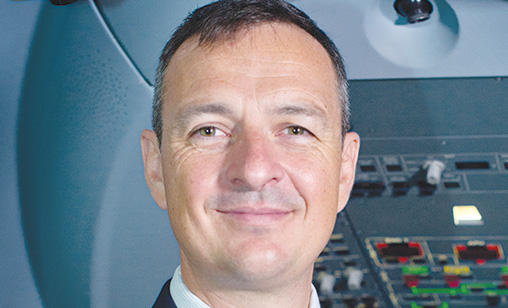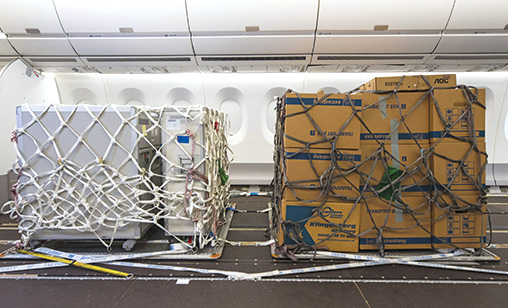Air Cargo
Airbus launches passenger cargo deck solution
May 1st 2020
Airbus has launched a modification package for its A330, A340 and A350 wide-bodies to allow placement of cargo pallets on the passenger decks of the aircraft types after removal of their economy class seating. Read More »
Airbus vice president of flight operations support, Captain Yann Lardet, told Orient Aviation last month he expected demand for the carriage of cargo on the passenger decks of aircraft to continue even when the world comes out the other side of the coronavirus pandemic.
 |
Capt. Lardet said the straight forward installation only required standard materials already widely available, including conventional existing pallets that were fixed to the passenger deck.
On a typical A350, this would add up to 7.8 tonnes, or 81 square metres of cargo, that could be carried in addition to existing belly capacity, he said.
“If I take the A350-900, you end up with a cargo capacity 42.9 tonnes, which is very significant for an aircraft meant to carry passengers and not cargo,” he said last month in a conference call to journalists.
“Make no mistake. This is not a passenger to freighter conversion. This is a temporary reconfiguration of the aircraft operators can activate to do cargo, to have extra capacity provided on the passenger deck. It is a very good upgrade in terms of capacity,” he said.
The types of cargo able to be carried in the passenger deck included humanitarian aid and personal protective equipment. Dangerous goods are prohibited.
Airbus’s Matthias Ierovante, who works on the A330/A350 program, said the pallets could accommodate 260kg per position and had an available volume of 2.7 cubic metres per pallet with the cargo load covered by a protective net.
On the A330, up to 28 pallets could be installed in economy class. The A350 could carry up to 30 pallets, he said.
The pallets were “quite quick” to install once the seats were removed, Ierovante said. “We think it can be done after seat removal in around two hours,” he said.
While the installation of the cargo pallets could be achieved without removing the business class seats, the aircraft could not carry both cargo and passengers on the same flight.
 |
And while this modification currently only applied to Airbus’s A330, A340 and A350 aircraft, Capt. Lardet said the technical solution could be used on narrow-body aircraft such as the A320.
He said about 1,200 people from 240 airlines participated in a webinar explaining the cargo solution in early April, four times the usual audience for such presentations.
Since the webinar some 140 airlines expressed an interest, with the Toulouse manufacturer now assisting about 20 operators to obtain certification from their home regulator.
The concept had potential to be used after the aviation market ramps up as government restrictions ease and the threat of the coronavirus pandemic began to subside, Capt. Lardet said.
“What we anticipate is basically, even after the crisis, there will be still quite strong market demand for cargo carrying capabilities on the passenger decks because the long-range aircraft traffic will resume only progressively. Previous capacity will come back in the air only progressively.”
In April, the European Union Aviation Safety Agency (EASA) provided guidelines to approve this type of operation on a temporary basis limited to eight months,
“With these approval guidelines and for eight months only, you can start to operate immediately with this solution.”
“To the customers who made the request, we are dispatching the data to allow them to apply for this approval towards their authority.
“And in parallel, the team of Matthias is working through the full certification of the solution that will arrive at the end of May,” the Airbus flight operations support vice president said.